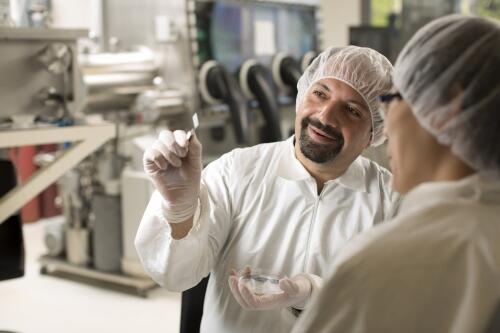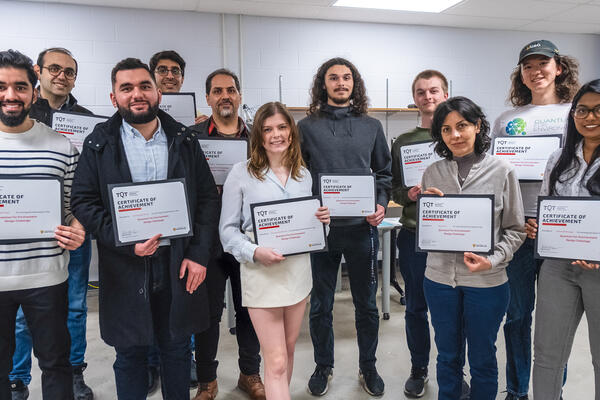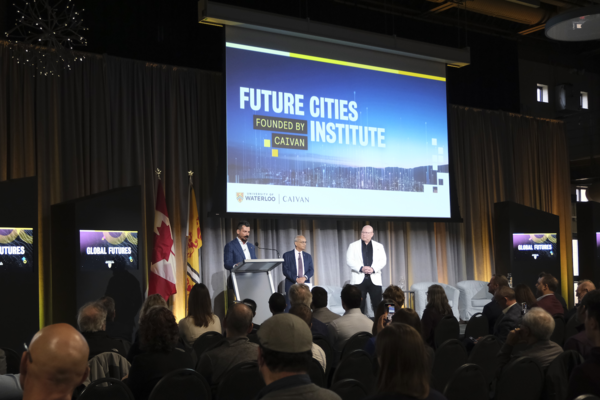The Natural Sciences and Engineering Research Council of Canada (NSERC) selected nine researchers from the University of Waterloo for increased funds to support their research deemed to be novel or potentially transformative, and likely to contribute to groundbreaking advances.
The recipients of the Discovery Accelerator Supplements announced today are among more than 100 researchers at Waterloo who have received more than $20 million to further their research through programs such as Discovery grants and grants for equipment.
“This funding provides a valuable boost to researchers entering a critical phase of their work and supports it at the next level. The results will, in turn, advance technology around the world and the Canadian economy,” said Professor D. George Dixon, vice-president, university research at Waterloo.
One of the nine to receive a supplement, Professor Hany Aziz from the Department of Electrical and Computer Engineering hopes his research will change the future of electronic devices and solar panels. He and his research team are studying organic semiconductors – the next generation of materials that will convert electrical power into light in devices such as laptops and cell phones, and harvest light from the sun and convert it into energy in solar cells.

Professor Hany Aziz. (Credit: University of Waterloo)
The supplement worth $120,000, in addition to a Discovery grant worth $300,000, will allow Professor Aziz to assist in making products such as laptops and cell phones cheaper and flexible. Users will be able to fold them or roll them up and down like a screen.
Although harvesting light from the sun and converting it into energy isn’t new, using organic material instead of silicon in solar cells is innovative, yet limiting.
“Understanding and adapting the way light is emitted is critical to the functionality of these new devices,” said Professor Aziz. “Use of organic material decreases reliability and performance over time in solar cells, which isn’t acceptable for practical use.”
Research like his will address some of the challenges affecting the future of environmentally friendly energy resources.
The other researchers from Waterloo that NSERC selected for supplemental funding in addition to a Discovery grant are:
- Professor Ihab Ilyas (David R. Cheriton School of Computer Science): Improving data cleansing and restoration, including scalable and holistic data cleaning, to produce real solutions for business needs.
- Professor Ondrej Lhotak (David R. Cheriton School of Computer Science): Developing the underlying techniques that are used in software development tools that enable programmers to work more efficiently, and specifically to find bugs in programs.
- Professor M. Tamer Özsu (David R. Cheriton School of Computer Science): Studying techniques for efficient storage and querying of large graphs, such as social networks, and methods for analyzing such graphs, such as finding relationships between people in a social network.
- Professor John Watrous (David R. Cheriton School of Computer Science, Institute for Quantum Computing): Investigating the potential of quantum computers, as well as interactions among multiple quantum computers, leading to a better understanding of quantum information and how it can be used in our society.
- Professor Sherry Schiff (Earth and Environmental Sciences): Studying dissolved organic matter in aquatic ecosystems, specifically how the type of organic matter governs water quality and the loss of greenhouse gases to the atmosphere.
- Professor John Wen (Mechanical and Mechatronics Engineering): Development of new nano-aluminum based energetic materials for use in civil and defence applications, such as powering nanosatellites and fabricating micro-electronic devices.
- Professor John T.W. Yeow (Systems Design Engineering): Development of micro/nanotechnology-based imaging instruments, such as x-ray and ultrasound machines.
- Professor Zhongwei Chen (Chemical Engineering): Development of graphene based metal-free or non-precious metal catalysts for next generation fuel cell applications.
- Professor William Cook (Combinatorics and Optimization): Extending the reach of discrete optimization and mixed-integer programming to guide industries through complex design procedures.









